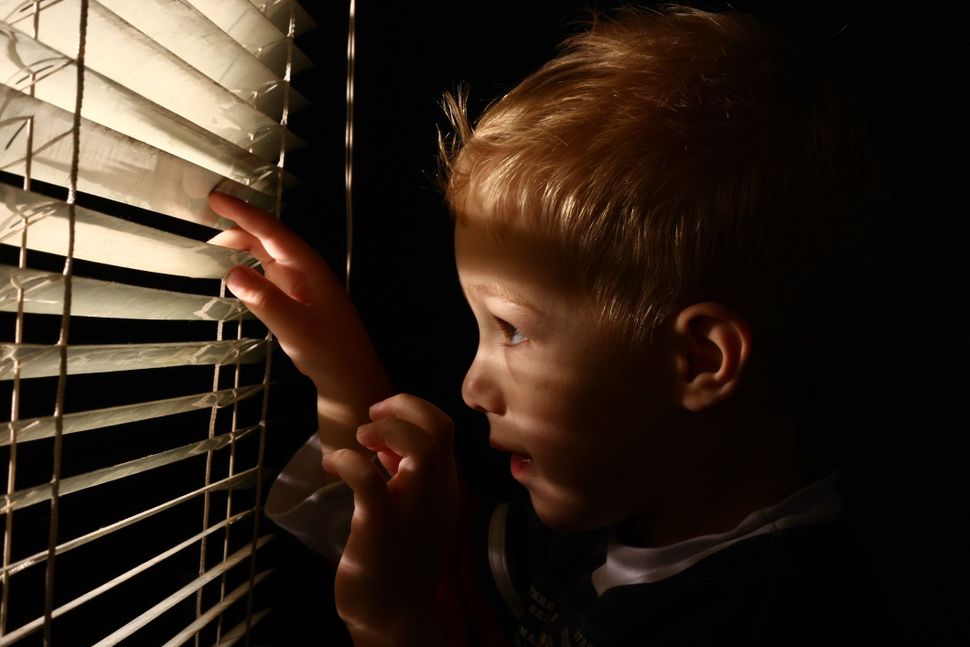Four Tips For Talking To Your Kids About White Supremacism

Image by iStock
It’s not about Charlottesville anymore. I wish it were that simple. But life, and parenting, rarely are.
In Boston, Laguna Beach, and Knoxville, white supremacists gather on our streets.
As a mother, I know that this is not the world I wanted for my children.
As a professor of education who studies how children make sense of current events, I know that in difficult times like these, children, too, know that all is not right. They watch the adults in their lives watching the world, and they yearn for someone to explain to them what is happening in a way that they can process.
Here are four tips for framing conversations with school-age Jewish children about the rise of white supremacy in 2017 America:
Frame the Conversation by Talking about (American) Values
One of the greatest opportunities and greatest challenges of parenting is the chance to frame the world for children. Conversations about the rise of white supremacy in the United States need a frame—a chance for you and your children to articulate the values that matter in your family and in your community.
You may want to begin by asking your children: What do you think are American values? Or What are the values that you would like the United States to live up to? School-age kids of all grade levels can add to the conversation about the values that the U.S. does, or should, represent: democracy, equality, pluralism, freedom, and more.
If your kids needs help, grab a quarter and help them find the words “liberty” on the front and “e pluribus unum” (out of many, one) on the back. Or ask them to think about the American leaders they have learned about in school (e.g. Abraham Lincoln, Rosa Parks) and the values these leaders embody.
Tell a Short Story about Current Events
Explain to your children the basic arc of the narrative that you would like them to understand.
Depending on the age of your children, and their existing level of familiarity with current events, the exact story can change. What matters is that you don’t inundate them with details, but that you do make a few key points about recent events. A sample story might sound like this:
Over the last few weeks, some people in our country have been doing some pretty hateful things. They are called white supremacists or Neo-Nazis, and they believe that the United States should be a place for white, Christian people. They’ve been gathering together in lots of different cities saying that people who are not white and Christian—especially African Americans and Jews like us—don’t belong in the U.S. In most of these cities, the gatherings have been loud but peaceful, but in some places they’ve also gotten violent. And in all of these cities where they’ve held rallies, large groups of people — in most places, much larger than the groups of white supremacists — have also held rallies to protest them and say that other people in the United States won’t stand for that kind of hate.
This kind of narrative is simple enough for children to understand, but also complicated enough that—if they want to—children can ask rich follow-up questions both about the white supremacists and about those who are working to oppose them. It also allows children to reflect upon all the places where they see people acting in ways that undermine and ways that support the values they have identified as important.
Answer Kids’ Questions
After that, take your cues from your children. Some children won’t want to know any more information. Some may want to understand more about white supremacists, while others will want to hear only about what is being done to stop or counter their rise.
Different children have different needs. You’ll need to be sensitive to your children by answering the questions that they have, which may be very different from the questions you think they should have.
Translate (Jewish & American) Values into Actions
Ask your children: What can we be doing to make sure that the values we care about are present in the world? Or How can we be part of the efforts to counter the spread of white supremacy?
Some children I know have suggested actions that directly respond to the events of recent days. One planned to make a lemonade stand to raise money for anti-hate groups. Another had the idea of writing letters to children at the synagogue in Charlottesville to let them know that they are not alone.
Other children take a different tact, responding to the darkness of current events by increasing light in the world. One seven-year old with whom I spoke said, “the white supremacists don’t understand that every person was made in the image of God. My plan to help stop them is to treat each person I meet with respect.”
By helping your children understand the presence of white supremacy in 2017 America, and then articulate and enact their own plans for countering it, you will be giving your children a gift. You will be initiating your children into the world that is, and helping them become partners in creating the world that should be.
Sivan Zakai, Ph.D., is the Sara S. Lee Assistant Professor of Jewish Education at the Hebrew Union College-Jewish Institute of Religion. She is the mother of three young children, ages 4, 7, and 10.

















